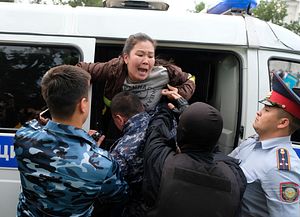City buses serve two purposes in Kazakhstan: Moving residents around urban areas for a small fee and transporting peaceful demonstrators to the nearest – or farthest – police station. Security forces, deployed by the thousands in Kazakhstan’s major cities, arrested approximately 1,000 people over the course of three days, starting from June 9, when the country elected Kassym-Jomart Tokayev in a highly criticized presidential election.
The majority of the people arrested were “helped onto” buses and police vans. Those who resisted were dragged and wailed forcefully, regardless of their age or affiliation. In fact, on election day, several journalists were detained, sparking harsh criticism beyond the usual condemnation of the limits to freedom of assembly in the country. The next day, one journalist following a march during the night was beaten up by police along with some demonstrators.
Assessing the violence, experts said that for the most part, the security personnel showed restraint, something Tokayev urged during the three days of protests. Yet, dragging unarmed, peaceful demonstrators and bystanders into police vans cannot be deemed nonviolent behavior, by any measure.
The largest demonstrations occurred in the city of Almaty, the country’s former capital and most populous urban center. Nur-Sultan, the recently renamed capital city, saw fewer demonstrations, albeit arguably more arrests. The prosecutor-general said that the security forces detained around 500 people during the first day of protests and lamented that three policemen were injured in the scuffles. In an official video, the government showed a few tense moments in which policemen were hit. The fate of the dozens injured as a result of police violence remained unknown to the public.
A French Revolution?
Speaking from exile in France, fugitive banker and self-appointed opposition leader Mukhtar Ablyazov urged people to assemble on the streets and squares demanding change. His live-streamed videos are the reason Facebook and YouTube have been largely inaccessible in the last year in Kazakhstan each evening. His call for action was heard by the authorities, who had an easy time flattening the range of protest sentiments onto Ablyazov’s movement, the outlawed Democratic Choice of Kazakhstan.
Anyone who happened to be at the spots Ablyazov remotely designed for protest was taken away and considered, albeit not officially, “influenced by foreign forces,” a shorthand for Ablyazov. This narrative, used also by so-called opposition candidate Amirzhan Kossanov to the bewilderment of his supporters, diverted focus from a thorough analysis of the various faces of the opposition and the nascent civic activism in the country. Oyan, a new civic movement that sprung out of various individual actions in the past months, publicly rejected any ties with Ablyazov.
When asked if he claimed responsibility for the demonstrations, Ablyazov washed his hands of the events, saying that “I don’t feel responsible or guilty for the arrests, because the government has to respond for this.” In the same interview with U.S.-funded Current Time, Ablyazov also said he represents the only opposition movement in the country, again implying that the discontent could only find an alternative in him. Ablyazov cannot return to Kazakhstan as a free man, as he is wanted for fraud related to his previous banking activity.
Flawed Elections, Again
At his inauguration on June 12, Tokayev said the electoral process was exemplary and democratic, in stark contrast with independent reports from the OSCE’s Office for Democratic Institutions and Human Rights (ODIHR), a watchdog that the government invited to observe the elections. In its preliminary report, ODIHR said the election “was tarnished by clear violations of fundamental freedoms as well as pressure on critical voices.”
Violations of electoral procedures were nothing new. The country’s polls have never been deemed “free and fair” by international observers. This year, according to diplomatic sources, the government engaged in a tug-of-war with ODIHR, because the watchdog had initially refused to go and monitor the election. “The government invited them, but ODIHR said that they wouldn’t go because they never saw any improvement in the electoral process and regarded another mission to Kazakhstan as a waste of time and resources,” a foreign diplomat said in April, after the government announced the early election for June 9. In the end, ODIHR decided to go in and were disappointed to see their prophecy confirmed.
The crackdown on protests after the inauguration was another show of force by the government, as swarms of security personnel dotted key assembly points in Almaty and Nur-Sultan, where in the end only a scant number of demonstrators arrived. Images of dozens arrested, whether they actively protested or not, made the rounds across social media, which was reactivated after several hours of blackout. Yet the scale of the demonstrations seemed to have waned as police and yellow vest-wearing journalists outnumbered the few actual demonstrators.
The authorities, however, demonstrated how difficult it has became to keep a finger on the pulse of the population. Early reports of officials informally pushing for a curfew in Almaty and preparing fire trucks and armed vehicles to counter large-scale actions betrayed a misjudgment of the people’s intentions. As long as the authorities prevent the existence of a platform for the free expression of opinions, this history is bound to repeat itself.
































